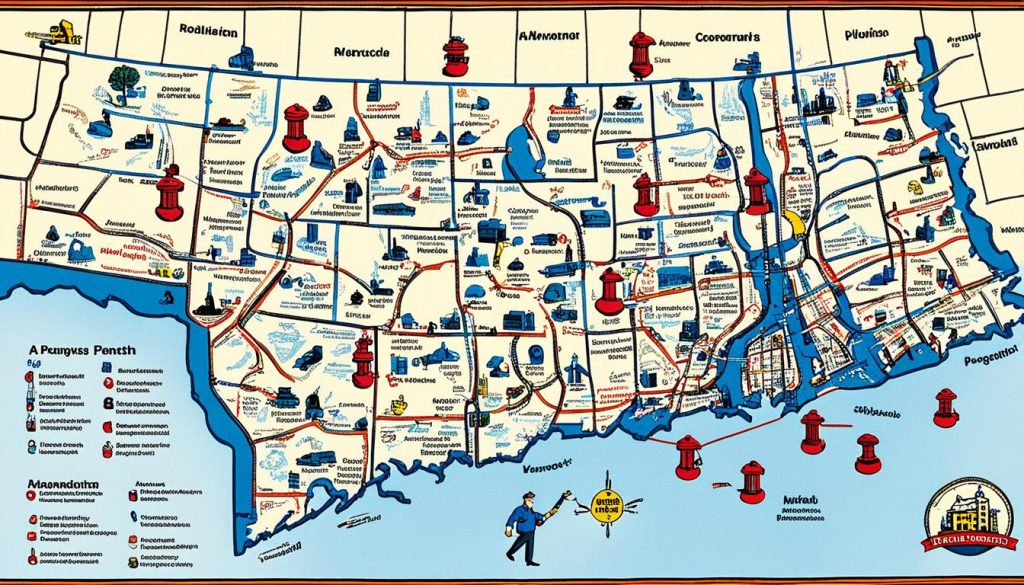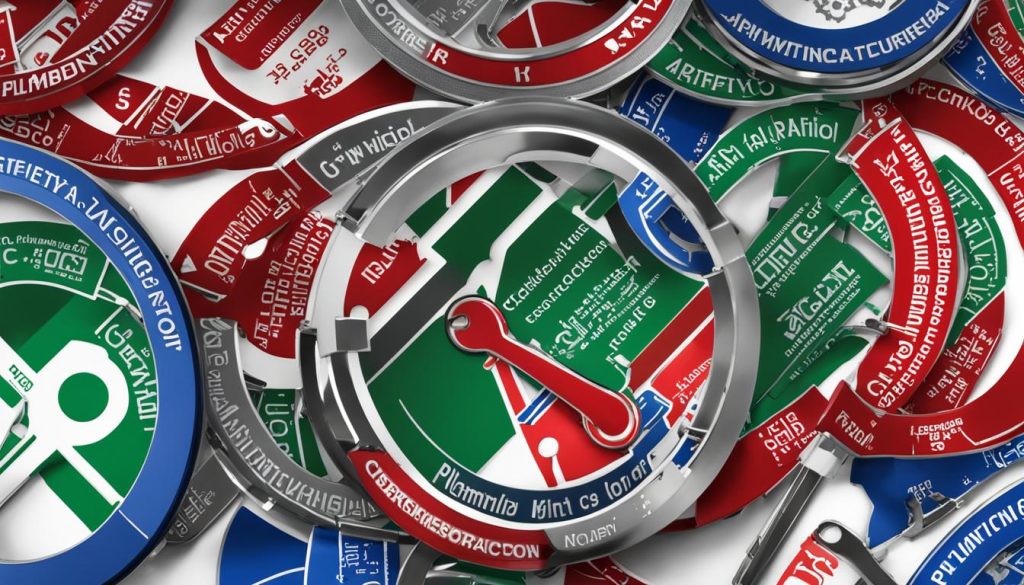Top Plumbing Trade Schools in Maryland | Learn Fast
Did you know that the plumbing industry is experiencing a significant demand for skilled professionals in Maryland? Plumbing plays a crucial role in every aspect of our daily lives, from clean water supply to sanitation systems. As the population grows and infrastructure expands, the need for well-trained plumbers continues to rise.
If you’re considering a career in plumbing, enrolling in a reputable trade school can provide you with the essential skills and knowledge to succeed in this rewarding field. In Maryland, there are several top-notch plumbing trade schools that offer comprehensive vocational programs, ensuring you receive the training you need to excel.
If you’re eager to learn more about plumbing trade schools in Maryland and the opportunities they offer, read on for insightful information and valuable tips.
Key Takeaways:
- Plumbing trade schools in Maryland provide hands-on training in plumbing codes, piping, and blueprints.
- Completion of a plumbing apprenticeship and passing a certification exam are essential to becoming a licensed plumber in Maryland.
- The demand for plumbers is steady in Maryland, with opportunities in residential construction, maintenance, and municipal projects.
- Graduates of plumbing trade schools can pursue various career paths, including maintenance, new construction, and even starting their own businesses.
- Safety certifications are often included in plumbing training programs, enhancing employability and emphasizing job safety.
Steps to Become a Licensed Plumber in Maryland
To become a licensed plumber in Maryland, there are specific steps you need to follow. These steps will help you gain the necessary skills, experience, and qualifications required to succeed in this rewarding trade.
- Complete an Apprenticeship: The first step is to enroll in a plumbing apprenticeship program. Apprenticeships provide a combination of in-school training and on-the-job experience. In Maryland, the apprenticeship process involves completing 720 hours of in-school plumbing training and 8,280 hours of work experience as a plumber apprentice.
- Gain Work Experience: During your apprenticeship, you will work closely with experienced plumbers to gain practical skills and knowledge. This hands-on experience is essential for becoming proficient in plumbing techniques, understanding building codes, and troubleshooting plumbing systems.
- Pass the Certification Exam: After completing your apprenticeship and gaining the required work experience, you will need to pass a plumber certification exam. This exam assesses your understanding of plumbing theory, regulations, and industry best practices. Successfully passing the exam will earn you a Certificate of Qualification (C of Q) and register you as a certified journeyperson plumber in Maryland, allowing you to work independently.
Completing a Plumbing Pre-apprenticeship training program can significantly enhance your chances of success in becoming a licensed plumber in Maryland. These pre-apprenticeship programs provide comprehensive training in plumbing fundamentals, safety protocols, blueprints, and job site etiquette. By enrolling in such a program, you can gain valuable hands-on experience and knowledge that employers highly value.
If you’re passionate about plumbing and interested in a fulfilling career in this trade, taking the necessary steps to become a licensed plumber in Maryland is an excellent choice. With the right training, experience, and qualifications, you can enjoy a rewarding career with job stability and growth opportunities.
Image related to Steps to Become a Licensed Plumber in Maryland:
Career Outlook for Plumbers in Maryland
When it comes to the demand for plumbers, Maryland offers a promising landscape with a steady need for skilled professionals. Plumbers in the state can find stable employment opportunities in various sectors, including residential construction, maintenance, and renovation.
But the demand for plumbers doesn’t stop there. Maryland also presents opportunities to work on exciting and impactful infrastructure projects. For instance, plumbers are sought after for jobs involving water treatment plants and city piping systems, which are crucial for providing clean and reliable water to communities.
Furthermore, the increasing emphasis on water efficiency in both public and commercial buildings has created a demand for plumbers who can install upgraded fixtures and systems. As environmental consciousness grows, so does the need for professionals who can contribute to sustainable practices in the plumbing industry.
By graduating from reputable plumbing trade schools in Maryland, aspiring plumbers can position themselves to capitalize on these career prospects. These schools equip students with the essential knowledge and hands-on skills needed to excel in the trade.
Upon completion of their training, graduates can find employment opportunities in various sectors. They can work on new construction projects, ensuring that buildings have efficient and reliable plumbing systems from the start. They can also contribute to the maintenance and renovation of existing structures, ensuring that plumbing systems remain in optimal condition.
Additionally, plumbers can play a crucial role in municipal water systems, ensuring that communities have access to clean water and effective wastewater management. Some graduates may even choose to leverage their training and experience to start their own plumbing businesses, offering their services to individuals and businesses in need.
Job Options for Graduates of Plumbing Trade Schools
Graduates of plumbing trade schools in Maryland have a wide range of exciting job opportunities awaiting them. The skills and knowledge acquired through plumbing trade school training prepare individuals for various career paths in the plumbing industry. Here are some job options available to graduates:
1. Maintenance Roles
Many plumbing trade school graduates begin their careers in maintenance roles. They work in residential, commercial, or industrial settings, performing routine inspections, repairs, and maintenance on plumbing systems.
2. New Construction Projects
There are also opportunities for plumbing trade school graduates to work on new construction projects. They collaborate with architects, contractors, and other construction professionals to install plumbing systems in newly constructed buildings.
3. Residential and Commercial Maintenance
Plumbing trade school graduates can also specialize in residential and commercial plumbing maintenance. They handle repairs, upgrades, and routine maintenance tasks for plumbing systems in homes, office buildings, hotels, and other commercial properties.
4. Renovation and Retrofit Work
With their knowledge of plumbing systems, graduates can find employment in renovation and retrofit projects. They contribute to transforming existing spaces by upgrading plumbing systems to meet modern standards.
5. Municipal Water Systems
Graduates may have the opportunity to work on municipal water systems. They contribute to the installation, maintenance, and repair of water supply and wastewater systems for cities and municipalities.
6. Plumbing Instructors
For those passionate about sharing their knowledge and experience, becoming plumbing instructors can be a rewarding career option. They can teach aspiring plumbers in vocational schools or trade schools, passing on their expertise to the next generation.
7. Plumbing Sales
Some plumbing trade school graduates may choose to work in plumbing sales. They can join plumbing supply companies, manufacturers, or distributors, utilizing their technical knowledge to assist customers in selecting the appropriate plumbing products and equipment.
8. Entrepreneurship
Entrepreneurial-minded graduates can start their own plumbing businesses. With their trade school training and experience, they have the necessary skills to handle plumbing projects, manage clients, and build a successful plumbing company.
All of these job options offer different challenges and opportunities for growth in the plumbing industry. Plumbing trade school graduates can find positions that align with their interests and goals, ensuring a rewarding and fulfilling career.
Safety Certifications and Training in Plumbing Trade Schools
Plumbing trade schools in Maryland prioritize the safety of their students and the future plumbers they train. That’s why many plumbing training programs include comprehensive safety certifications as part of their curriculum. These certifications are essential for aspiring plumbers, as they not only demonstrate a commitment to job safety but also increase employability in the plumbing industry.
Common safety certifications included in plumbing training programs cover a range of important areas. These certifications provide students with the knowledge and skills they need to navigate potential hazards in the workplace. Some of the key safety certifications that plumbers-in-training can expect to obtain include:
- WHMIS (Workplace Hazardous Materials Information System)
- Working at heights
- Elevating work platforms
- Lockout and tag safety
- Scaffold users’ hazard awareness
- Confined spaces hazard awareness
By earning these safety certifications, aspiring plumbers demonstrate their dedication to maintaining a safe working environment, protecting themselves and their colleagues from potential risks. These certifications not only instill valuable knowledge but also provide an extra layer of credibility when seeking job opportunities or applying for plumber apprenticeships.
| Safety Certification | Description |
|---|---|
| WHMIS (Workplace Hazardous Materials Information System) | Teaches students about the handling and storage of hazardous materials commonly encountered in the plumbing industry. |
| Working at Heights | Provides students with the knowledge and skills needed to safely work at elevated heights, such as on roofs or scaffolding. |
| Elevating Work Platforms | Focuses on the safe operation of equipment like scissor lifts and cherry pickers, which are commonly used in plumbing projects. |
| Lockout and Tag Safety | Teaches students how to properly isolate and secure plumbing systems to prevent accidents and injuries during maintenance or repair. |
| Scaffold Users’ Hazard Awareness | Equips students with the skills to identify and mitigate the hazards associated with working on scaffolding structures. |
| Confined Spaces Hazard Awareness | Focuses on the potential risks and safety precautions required when working in confined spaces, such as crawlspaces or underground tunnels. |
Graduates’ Success and Testimonials from Plumbing Trade Schools
Graduates of plumbing trade schools in Maryland have achieved remarkable success in the industry. They have secured employment with reputed companies that recognize the value of their training and skills. Some notable examples include Fred Kau Plumbing & Heating, Mr. Rooter, JERMARK, L.J Barton Mechanical, Hy-Mark Guelph, and Reliance Home Comfort.
These success stories serve as a testament to the effectiveness of Maryland’s top plumbing trade school programs in preparing students for real-world job opportunities. Instructors and graduates alike praise the practical skills and knowledge acquired through these programs. They also applaud the high-quality training facilities and the dedicated support provided by the schools’ career development teams.
By enrolling in one of Maryland’s top plumbing trade schools, students gain extensive hands-on experience and comprehensive theoretical knowledge. This prepares them for the challenges they may encounter in their future careers. Graduates emerge ready to tackle the demands of the plumbing industry, equipped with the necessary skills to excel in their chosen paths.
Source Links
- https://marylandphcc.com/education/
- https://www.herzing.ca/programs/plumber-pre-apprenticeship
- https://www.learnhowtobecome.org/best-plumbing-programs/
- Investing Wisely: How Windows & Doors in Boost Property Value and Financial Health - April 24, 2025
- The Financial Impact of Personal Injuries: Why Legal Help Matters for Business Owners - April 16, 2025
- The Hidden Financial Costs of Domestic Assault: What Business Owners Need to Know - April 16, 2025













